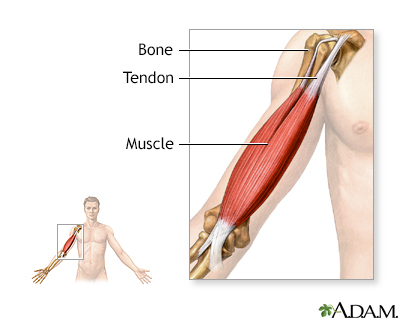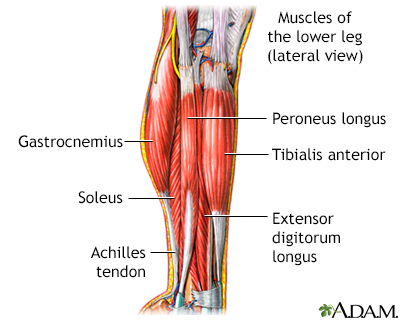Muscle twitching
Definition
Muscle twitches are fine movements of a small area of muscle.
Alternative Names
Muscle fasciculation; Fasciculations of muscle
Considerations
Muscle twitching is caused by minor muscle contractions in the area, or uncontrollable twitching of a muscle group that is served by a single motor nerve fiber.
Muscle twitches are minor and often go unnoticed. Some are common and normal. Others are signs of a nervous system disorder.
Causes
Causes may include:
- Autoimmune disorders, such as Isaac syndrome.
- Drug overdose (caffeine, amphetamines, or other stimulants).
- Lack of sleep.
- Drug side effect (such as from diuretics, corticosteroids, or estrogens).
- Exercise (twitching is seen after exercise).
- Lack of nutrients in the diet (deficiency).
- Stress.
- Medical conditions that cause metabolic disorders, including low potassium, kidney disease, and uremia.
- Twitches not caused by disease or disorders (benign twitches), often affecting the eyelids, calf, or thumb. These twitches are normal and quite common, and are often triggered by stress or anxiety. These twitches can come and go, and usually do not last for more than a few days.
Nervous system conditions that can cause muscle twitching include:
- Amyotrophic lateral sclerosis (ALS), also sometimes called Lou Gehrig disease or motor neuron disease
- Neuropathy or damage to the nerve that leads to a muscle
- Spinal muscular atrophy
- Weak muscles (myopathy)
Symptoms of a nervous system disorder include:
- Loss of, or change in, sensation
- Loss of muscle size (wasting)
- Weakness
Home Care
No treatment is needed for benign muscle twitching in most cases. In other cases, treating an underlying medical cause may improve symptoms.
When to Contact a Medical Professional
Contact your health care provider if you have long-term or persistent muscle twitches or if twitching occurs with weakness or loss of muscle.
What to Expect at Your Office Visit
Your provider will take a medical history and perform a physical exam.
Medical history questions may include:
- When did you first notice the twitching?
- How long does it last?
- How often do you experience twitching?
- What muscles are affected?
- Is it always in the same location?
- Are you pregnant?
- What other symptoms do you have?
Tests depend on the suspected cause, and may include:
- Blood tests to look for problems with electrolytes, thyroid gland function, and blood chemistry
- CT scan of the spine or brain
- Electromyogram (EMG)
- Nerve conduction studies
- MRI scan of the spine or brain
Gallery




References
Deluca GC, Griggs RC. Approach to the patient with neurologic disease. In: Goldman L, Schafer AI, eds. Goldman-Cecil Medicine. 26th ed. Philadelphia, PA: Elsevier; 2020:chap 368.
Hall JE, Hall ME. Contraction of skeletal muscle. In: Hall JE, Hall ME, eds. Guyton and Hall Textbook of Medical Physiology. 14th ed. Philadelphia, PA: Elsevier; 2021:chap 6.
Weissenborn K, Lockwood AH. Toxic and metabolic encephalopathies. In: Jankovic J, Mazziotta JC, Pomeroy SL, Newman NJ, eds. Bradley and Daroff's Neurology in Clinical Practice. 8th ed. Philadelphia, PA: Elsevier; 2022:chap 84.